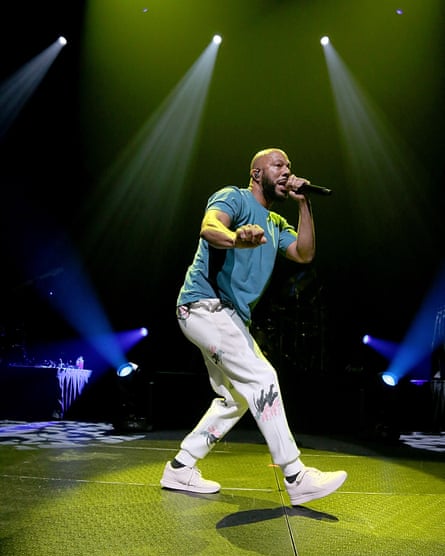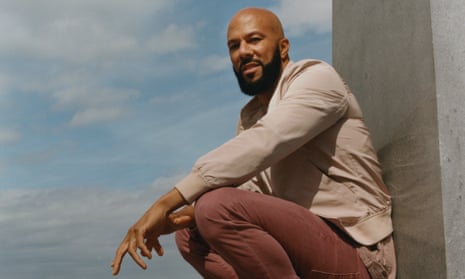It’s apt that Common and I meet in Philadelphia, the US city of brotherly love. The rapper, who is also an activist and Emmy-winning actor, has a preoccupation with the subject, which he believes should be the driving force behind personal and social change. “My mother’s love was the first thing I pretty much knew,” he says as we drive to the soundcheck for a gig. His new album, Let Love, his 12th, is full of lush, moving jazz and soul-tinged odes to life, hip-hop, his mother, his 22-year-old daughter, his hope for a future romantic relationship and to God.
Common, 47, speaks powerfully about his childhood, growing up on Chicago’s notorious South Side. His parents split when he was a baby, but he maintained regular contact with his father, and his grandmother walked him to school. There he met Mr Brown, a teacher who “took a lot of pride in what it was to be a black man”. Although the drugs and gangs that plagued the neighbourhood were close by, “it wasn’t like every day we were walking around dodging bullets,” Common explains in a laid-back drawl. “The ultimate thing was that, man, I had something to aspire to. One of the solutions to the violence that goes on in the inner city is providing young people with something [that makes them] feel valued.”

He’s become known for writing conscious rap, but his debut album, Can I Borrow a Dollar, came out in an era when gangsta rap was the genre’s driving force. It depicted a less mature person, particularly on the misogynist track Heidi Hoe. “I definitely put a lot of that down to youth,” Common explains, sounding a bit embarrassed. “It was ‘bros before hoes’ – stuff you’re repeating from your homies when you’re not really thinking for yourself yet.”
After the album failed to achieve commercial success, he embarked on a journey of personal and spiritual growth. He read the Bible and the Qur’an, listened to jazz and worked on his craft as an MC. Two years later, he came back with a critically acclaimed second album, Resurrection. It was “as if Common had gone from playing dozens on the corner to standing in as an elder statesman”, declared one critic. “[He was] socially conscious, verbally dexterous and seemingly wise beyond his years.” Clearly, his underwhelming experiences with his first album affected him. “I named the album Resurrection because I felt like I was coming back from the dead,” he says, with a deep belly laugh.
“My ambition initially was driven by wanting to be seen, wanting to be heard – I wanted to be the dopest. But when I started writing stories about myself I would have people come to me and say, ‘Wow, your song Retrospect for Life [about abortion] made me decide to have my child.’ When people start telling you how your music has affected them, you know that it has a higher purpose.”
The experience taught him that change doesn’t happen unless you make it happen. He applied the same line of thinking to acting, which he began studying in 2001. He’s appeared in more than 50 movies – including a role in Ava DuVernay’s Selma and in the next 10 years, he says: “I want people to say, “Man, he’s one of the great actors of his generation.’” Calling acting enlightening and therapeutic, he says it has taught him that “what’s more important than being cool is telling the truth”.
This might sound like so much celebrity puff, but Common credits acting with a profound late-in-life revelation. While filming The Tale, a film about sexual abuse starring Laura Dern, he recalled that he had been molested as a child by a male relative of a family friend. Common opens up easily about the recollection: “It was something I had removed from my thoughts, but through being part of the movie, the situation came to my memory. As a kid I must have felt, ‘I don’t want nobody to know about this, I don’t wanna get in trouble or get this person in trouble’, so I just didn’t let it exist in my mind.”

He also wrote about this in his memoir, Let Love Have the Last Word, published earlier this year. “I’ve recently been getting into the mental health of the community and how we deal with some of the issues that are generational [but] we never talk about,” he says. “This is one of them.”
At first reticent to write about the issue – music was “a safer place” to deal with it, he says – he discussed it with his mother, who told him something similar had happened in their family. “It was something people never talked about, but the not talking about it is what allows it to continue,” Common says. He felt it was vital he share his story so that “anybody who has experienced [abuse] can feel they don’t have to carry the shame and can figure out a way to get past it and heal”.
The topic of healing weighs heavily on the rapper’s mind these days, especially when it comes to race, poverty and US politics. “There has to be a shift in values,” he says. “What can we offer our communities to provide people not only with hope but with practical ways to advance and live a full life?”
More than a decade ago, he created the Common Ground Foundation, which focuses on empowering high-school students from underserved communities. It is about to open the Art in Motion charter school in Chicago. He is also involved in criminal justice reform initiatives. Since 2017, he has toured California prisons, talking to and performing for inmates. His efforts have been credited with helping pass a bill in California that allows young offenders sentenced to life without parole the opportunity to have their cases reheard.
Sitting on his tour bus after his show, Common sips on red wine while showing friends the video for Show Me That You Love, a song about how his relationship with his daughter has evolved. A few years ago, she told him she didn’t think he had been the best father – he was separated from her mother and away on tour all the time – and she felt that he didn’t really care about her. At first, Common says, he was defensive, but then they started mending their relationship with the help of therapy.
“It’s important that people see there are artists out there who have achieved, but they still have issues they are working through,” he says, explaining why he wants to reveal vulnerability in his music. “This is why I talk about therapy and mindfulness and meditation in my [new] songs. It’s why I talk about being molested, and my father. The job of the artist is to not always show the accolades.”
